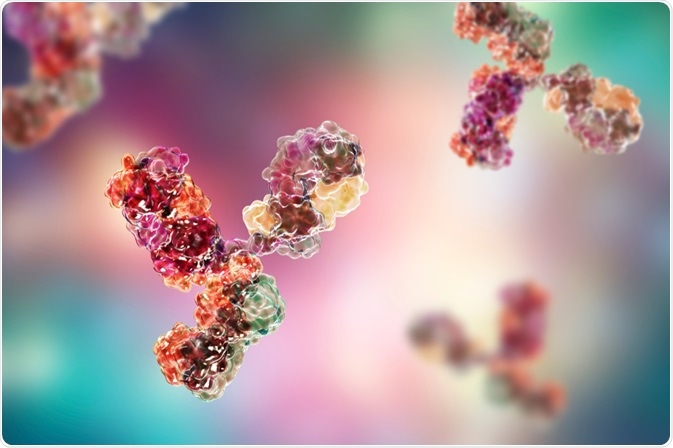Natural antibodies are the first line of the organism’s defense, which are spontaneously produced without specific immunization, in germ-free conditions. They are the first line of defense of the newborn organism that is found without prior experience to antigens.

Antibodies. Image Credit: Kateryna Kon/Shutterstock.com
The origin and role of natural antibodies
B1 lymphocytes, which are a subpopulation of B lymphocytes, are produced in waves during ontogenesis (the origination and development of an organism), mainly in the fetal and post-fetal period. They are not produced at later life stages. They are characterized by unique gene transcription and protein expression.
B1 lymphocytes have the basic function of B lymphocytes of producing antibodies, which are pivotal for the protection of the organism against pathogens. The main sources of natural antibodies, both in humans and mice, most likely are B1 lymphocytes and B lymphocytes of the marginal zone. It is proposed that B-1 cells produce 80-90% of resting IgMs of the serum and 50% of resting serum IgAs (the major isotype of switched B-1 cell immunoglobulin).
IgMs are the most studied natural antibodies in humans and mice. Natural antibodies are autoreactive, polyreactive, and they exhibit a relatively modest anti-microbial affinity. Polyreactivity assures different heterology for a single antibody, though this is also dependent on widely arranged surface antigens, which could increase their avidity. The reason for their high efficiency is due to the special manner of their conformational changes in the Fc region.
Role of natural antibodies in human health and disease
Natural antibodies are linked with different human infectious diseases and disorders, including cancer, cardiovascular diseases, diabetes, and neurological disorders. High levels of self-binding natural antibodies usually correlate with protection or the absence of disease, whereas lower levels are usually negatively correlated with the onset and progress of disease.
Profiles of human self-binding natural antibodies were proposed to be surrogates or fingerprints for the health and physiological status of people, including parasite diseases such as schistosomiasis and malaria. Lower homeostatic natural antibody levels were correlated with a relative loss of protection against molecules involved in diseases whose incidence increases in old age, suggesting that people with great loss may be at the highest risk of disease.
Therefore, natural antibodies are considered to be surrogates for susceptibility to several age-related diseases.
It is proposed that natural antibodies have an important role in the prevention of illnesses, including autoimmune diseases, which could be related to anti-Gal antibodies and/or anti-Gal natural antibodies in Henoch-Schönlein purpura and Crohn’s disease. They are used in the treatment of bacterial infections and in the case of degenerative diseases linked with toxic particle accumulation.
Natural antibodies have been programmed during the origination and development of an organism, facilitating normal development of mammals by ensuring all the necessary functions and protection against common pathogens, where there will be no adaptive antibodies at this early time. Such a state influences immunological balance and tissue homeostasis pivotal in anticancer protection and infectious diseases.
Natural antibodies also participate in tumor prevention. Natural antibodies bind with the tumor antigen NGcGM3, which could be present during lung cancer, leading to the elimination of cancer cells in a mechanism dependent on the complement and/or an oncosis-like mechanism. Natural antibodies were also observed in reactions with the amyloid present in Alzheimer's disease, the ganglioside of neurons in the Guillain-Barré syndrome, and the Thomsen-Friedenreich tumor antigen.
Therefore, it is possible that natural antibodies could be also considered as biomarkers in the clinical studies of these conditions. Natural antibodies play an important role in allograft rejection and transplantation immunology. Natural antibodies against the oligosaccharide moieties of the ABO blood group system have been previously reported and a mismatched blood transfusion results in hyperacute transplantation rejection with severe clinical consequences.
Graft B-cells infiltrate coronary arteries leading to cardiac allograft vasculopathy, an accelerated form of coronary artery disease limiting the long-term survival following cardiac transplantation. It was reported that half of 100 B-cell clones isolated from three coronary artery disease cases exhibited oligo-reactivity toward apoptotic cells, insulin, dsDNA, LPS, and cardiolipin.
Natural antibodies were acknowledged as the first line of defense against infectious agents. IgM natural antibodies may be involved in tuberculosis as low serum IgM levels against phospholipids were seen after intensive phase treatment, which could be due to a decrease in bacterial burden. Nevertheless, a decrease in IgM contrasts with the observation in other models where a reduction in natural antibodies is usually a negative sign for disease.
An age-dependent reduction in IgM natural antibodies against pneumococcal capsular polysaccharides and IgG natural antibodies against a pool of virulence-associated proteins of various Streptococcus pneumoniae strains was seen in humans, which can increase susceptibility to S. pneumoniae infection.
Sources:
- Grönwall, Caroline, and Gregg J. Silverman. "Natural IgM: beneficial autoantibodies for the control of inflammatory and autoimmune disease." Journal of clinical immunology 34.1 (2014): 12-21.
- Palma, Joanna, et al. "Natural antibodies–facts known and unknown." Central-European journal of immunology 43.4 (2018): 466.
- Panda, Saswati, and Jeak L. Ding. "Natural antibodies bridge innate and adaptive immunity." The journal of immunology 194.1 (2015): 13-20.
- Reyneveld, G. IJsbrand, Huub FJ Savelkoul, and Henk K. Parmentier. "Current understanding of natural antibodies and exploring the possibilities of modulation using veterinary models. A review." Frontiers in Immunology 11 (2020): 2139.
- Rothstein, Thomas L. "Natural antibodies as rheostats for susceptibility to chronic diseases in the aged." Frontiers in immunology 7 (2016): 127.
- Silverman, Gregg J. "Protective natural autoantibodies to apoptotic cells: evidence of convergent selection of recurrent innate-like clones." Annals of the New York Academy of Sciences 1362.1 (2015): 164.
Further Reading
Last Updated: Aug 11, 2021